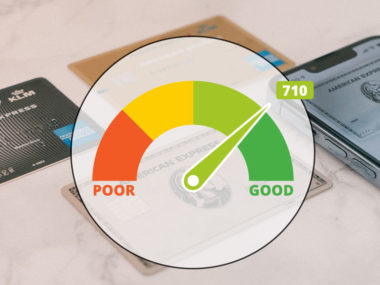With something as important as your credit score, it’s scary to think that there can be mistakes showing up on your credit report, lowering your score, and affecting your financial options, but it is possible — even common. Credit reports aren’t completely accurate, but it is largely your responsibility to find any mistakes on your report, or hire professionals to help you repair your credit. Here are some of the most common mistakes that turn up on credit reports that aren’t actually your fault.
Table of Contents
Missing Information on Your Report
The way credit bureaus get your information for credit reports can lead them to miss some of the details. The bureaus rely on companies like banks, creditors, landlords, and lenders to update them on how responsible you are with your money, particularly whether you are paying off your debts and other financial obligations. The problem here is that not every organization that you do business with sends information to all three credit bureaus — if any at all.
Missing information is the one of the most common reporting mistakes, but also one that usually has the least impact on your credit. It’s unlikely that major events in your history, like taking out a massive loan or failing to pay off a credit card, will be missing. The types of information that are likely to be missing are simply updates to your credit, like that you are constantly paying your debts. Utility companies or subscription services like your cell phone are also very inconsistent about reporting, meaning that your history of payments may not turn up on a credit report at all. This just means that you will miss out on a tiny amount of credit history, but usually this is nothing to worry about.
The exception to all of this might be if you finally paid a delinquent account, but your lender or creditor has not yet updated the credit reporting companies. In this case, the missing information detailing that you have made your final payment would diminish the impact of a negative item in your history, and you’ll want to get it updated as soon as possible.
Somebody Else’s Information on Your Report
If you have a common name, it’s quite possible for credit bureaus to mistake your identity with another person, and attribute their actions onto your report.
This happens especially if you share your name and birthdate with another person in the United States. The major identifications that the credit bureaus use are a person’s name, birthdate and social security number. When somebody checks your credit, they use all three, but when they then send and update your information to the bureaus, they might or might not not use all three. This makes it remarkably easy for financial data to either go missing, or for someone else’s data to wind up on your report.
If all three pieces of identification aren’t sent, it forces the bureau to try and figure out who different pieces of information — and fiscal behavior — belong to. If that information is stuff like missed payments on debts, or making payments on delinquent accounts, that can severely impact your credit score.
This problem is very common among people who have popular names, or family members who have named their children after themselves, with the only separation being surnames of Senior and Junior. It doesn’t have to be malicious parents that ruin their children’s credit, nor children that ruin their parents’ credit.
Falling Victim to Identity Theft
If you ever fall victim to identity theft, your credit report is likely riddled with mistakes, courtesy of the criminal. They apply for credit cards in your name, using your identification, meaning that it all affects your credit report. Then, as they use your credit card and the bills come due, all of the missed payments and the charges going to collections hit your report. If this isn’t caught and corrected, it can decimate your credit score, and will stay on your history until you go through the act of getting it removed.
Technically, this isn’t a reporting mistake on the part of the bureaus, but it can quickly become compounded when the bureaus don’t update their reports in response to your credit repair efforts. It not uncommon for accounts in collections to be sold between collections companies; each time a debt changes hands, it is possible for it to get reported on your history as a new delinquent debt. One case of stolen identity can rapidly morph into a series of negative history items if not caught and corrected.
Problems From a Divorce
When two people are married, it’s a very common practice to merge finances together. Couples combine their bank accounts, take loans out together, and become authorized users on each other’s credit cards.
When people get divorced, it becomes difficult to separate those accounts, and determine who is held responsible for what. People might charge a large amount of money onto a credit card that falls to their ex-spouse to pay, ruining their credit.
If you are legally divorced from a person, but their charges and listings still show up on your credit report, you can get them removed if you’ve done the work ahead of time. If the accounts are separate, and you aren’t the owner anymore, than it is a mistake and can be removed. However, if the accounts are still joint and connected, it’s likely you can’t get the charges removed.
Repeating Information
There are no rules behind when companies send your information to the bureaus, and there are some companies that will continue sending the same information over and over.
While this isn’t a big deal if you are paying all of your bills on time, if you have missed payments in the past, this could be a problem. If the same information for a missed payment is sent to the bureaus over and over, each time it will be logged as an individual instance. This reflects poorly on your report, can make your credit dive bomb, and can give other lenders the impression you have no money or fiscal sensibility.
There are two reasons why this might happen, even after you have paid off a debt (late or not). The first is that there is a bug in your lender’s system, causing it to stay in a state where it says you haven’t paid, and the information is getting reported as such to the bureaus. The second situation is that you are late on a payment, and your lender is trying to force you to pay by threatening your credit with multiple reports of missed payments.
If you do miss a payment, a singular instance is valid on your credit report, per month that you miss it. But if you have multiple listings for the same missed payment from the same month, those count as a mistake and can get removed. But if the missed payment listings are from different months, those are valid and will stay.
Fixing the Mistakes
If you do find mistakes and errors on your credit report, you can get them removed. It requires reaching out to the individual credit bureaus in a very specific way, telling them exactly what mistakes they made, and requesting that they remove it. We’ve provided letter templates to help you get started, as well as information on more specific problems.
This process isn’t easy though, and requires very specific language to force the bureaus to update their records correctly. A single mistake in that process can lead to the mistakes not being removed. While you can use the letter templates linked above, it’s recommended that you look into a credit repair professional to help with this process and make sure that you can get those mistakes removed.
For more credit score tips and guides, visit our credit score resource and learning center.
Image Source: https://depositphotos.com/





